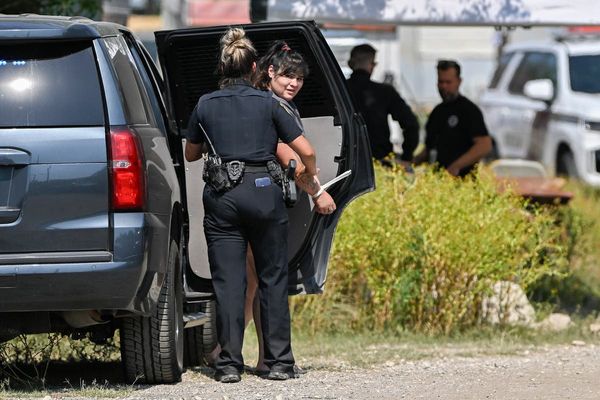
There was once an overgrown strip of unclaimed land on the coast of Kent by the side of a road, festooned with nondescript shrubs and peppered with brambles and nettles. It was not likely to have brought cheer to passersby.
Then a group of local women got together and planted fruit trees, strawberries, rhubarb, vegetables and lavender, as well as self-seeding flowers and bushes. When they ran out of space, they started planting on the other side of the road.
“It has had a big impact,” says Vicky Knight, a council officer who effectively became a guerrilla gardener when she led the efforts to transform the unclaimed 50 sq-metre area that runs down the side of her home in a Whitstable village into a community garden.
“So many people tell me how much they love it and how much it has inspired them to do something themselves.”
Knight says she has raised hundreds of pounds for a local food bank by selling some of the plants, which she uproots before planting and nurturing others.


Depending on the season, she can have too much fruit and veg to handle. “I leave a note inviting people to pick their own,” she says.
A local journalist reported: “It is an island of living colour in what is otherwise a slightly dull municipal garden environment.”
Guerrilla gardening has long been happening under the radar – since amateur planters may not have the legal right to cultivate even abandoned, uncared-for sites.
But people are increasingly documenting themselves transforming barren slices of land into flower gardens and community gardens across the UK.
Many seek council permission, or establish that land is unclaimed, before seeding the soil. And they do not seem to face much, if any, opposition. Who would object to a bouquet of flowers on their doorstep?
On Tyneside, a group of neighbours got permission to turn a paved area of council land at the bottom of their street into a garden for wildlife.
“Local people and businesses kindly donated money for planting, when they saw what we were trying to do,” says Sue Hope, a resident who helped create the Hawthorn Wildlife Triangle in Whitley Bay.
The paving slabs were lifted, and the council cleared them away. Then the group spread three tonnes of top soil and planted native trees, shrubs, bulbs, wildflowers and grass in April last year. Now, the wildlife garden is becoming self-sustaining, apart from strimming twice a year and a late autumn clearing-away of the fallen leaves.


“There were lots of different insects spotted this year and huge numbers of ladybirds appear to have made a home in the plants and fallen tree trunks,” says Hope.
Amid pandemic lockdowns and the risk of increased social isolation, community groups emphasised the importance of spending time in nature, and in communal spaces.
Plus, supermarket shortages and the cost of living crisis have nudged people into becoming more self-sufficient and growing their own produce. (Only advisable where the soil is healthy: not next to a road in central London, for instance).
In Devon, Sarah Kehaya, a retired teacher, has led a project called Growing Space, which cleared a piece of disused land owned by the Royal British Legion by the River Ashburn in 2021 and created a community allotment. It now leases the land in Ashburton for a nominal fee.


“We have contributed potatoes, onions, beans, beetroot, kohlrabi, tomatoes, squash, loganberries, rocket and herbs to the community fridge,” she says.
Volunteers who do not have gardens can also harvest for their own use, and a seating area has been constructed, providing a place for local people to gather.
“A space for wellbeing has been created in place of an area dominated by brambles, weeds and litter,” Kehaya says.
Studies have consistently found that time in nature has significant benefits and is linked to reduced blood pressure while easing anxiety and depression symptoms.
Replacing litter-strewn paving slabs with mini-meadows and establishing much-needed allotments where there was previously overgrowth could have untold benefits.
Fran Elliott, a Department for Education statistician, took it upon herself to revamp an abandoned community garden the size of a tennis court near her house in Heeley Green, Sheffield, after walking past it each day.
“All the beds were filled with grass and weeds and there was a lot of litter,” she recalls. In 2019, she decided to go down there with a spade.
“I didn’t really have a plan, I just had an urge to do something to improve the site for nature and the community,” she recalls.
“Some local people came to help and we slowly started to transform the space. The council helped us to set up a community group and we now are responsible for the upkeep.”


A pond was constructed and fruit trees were planted, along with spring bulbs, wild flowers and a hedgerow. “A small minority would walk past and say: ‘No point, it will all get vandalised,’” Elliott says.
But, apart from a few minor incidents, the project has been a big success and the site is well-loved by those who use it.
Bees, ladybirds, moths and butterflies flocked to the site, and there was recently a frog sighting.
“The transformation has been a real community effort,” Elliott says, with local groups helping to paint a mural and carry out manual work. “We feel proud of what we have achieved and it is a real joy to see local people coming here.”







